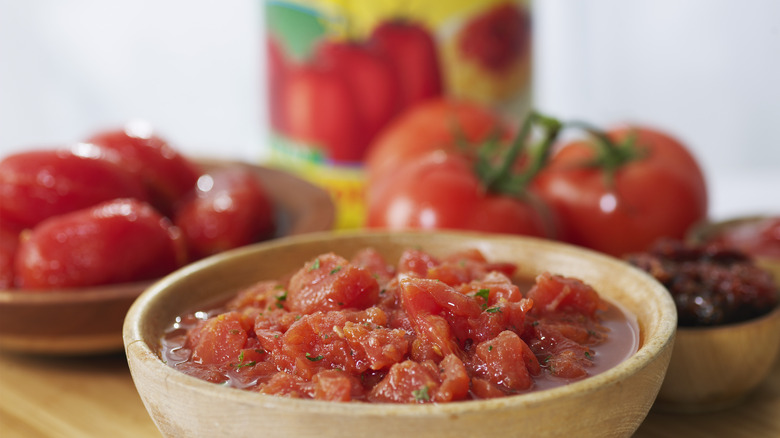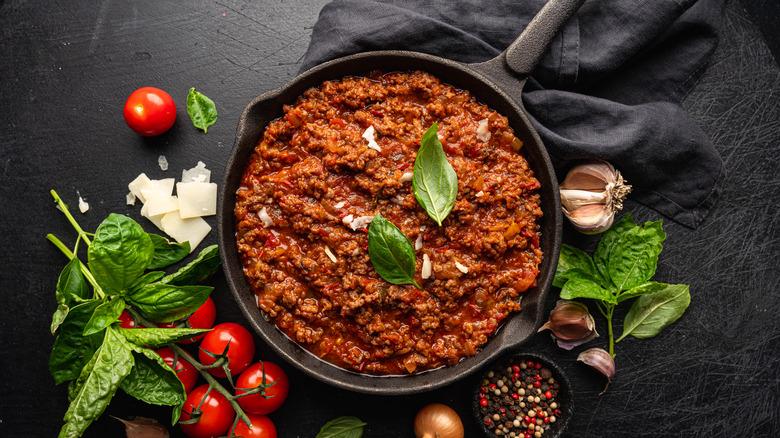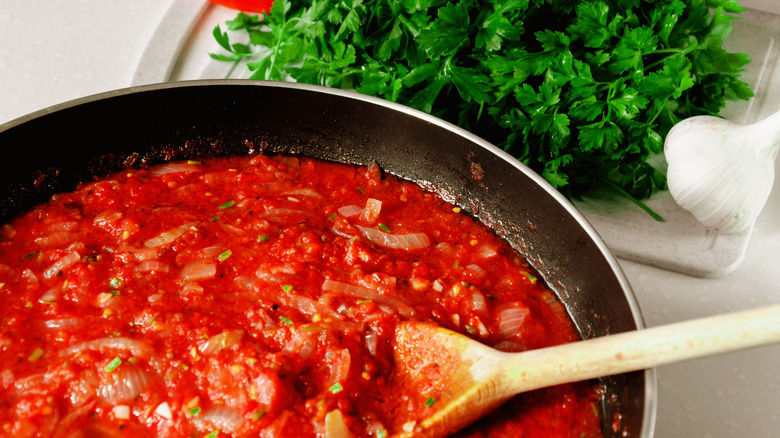What Makes Gravy And Sauce Different
We may receive a commission on purchases made from links.
The gravy versus sauce debate runs deep in the Italian American culture, sparking more than a few robust conversations, loud and with hand gestures. With Thanksgiving around the corner, it would be natural to assume we're talking about the brown gravy smothering the turkey (sometimes masking a dry bird) made from the pan drippings. However, some Italian Americans have used 'gravy' to describe a type of tomato sauce used on pasta too. Interestingly enough, brown gravy, sauce, and the Italian American use of 'gravy' are all roughly connected.
According to Delicious, in Italy, a traditional tomato sauce is sugo. Simmered with onions or garlic and aromatic herbs like basil, the thin red sauce is also the base for other Italian sauces traditionally placed on pasta, like arrabiata. When meat is added to tomato sauce, Italians call it a ragú. Beginning with the trinity of celery, onions, and carrots as its base, ragús contain ground meat like beef or pork and are slow-cooked for hours, thickening and allowing all the flavors to meld together. The famous meat sauce in spaghetti Bolognese is a ragú (via La Cucina Italiana).
Just like famous Italian Americans like Martin Scorsese (pro sauce) and popular shows like "The Sopranos" (definitely team gravy) have weighed in on the debate, Italian Americans know where their families fall.
What is gravy?
As Lorraine Ranalli discovered in her book "Gravy Wars," Italian immigrants in the Northeast, particularly the Bronx, Philadelphia, and South Boston, are responsible for using 'gravy' to describe a red sauce thickened with meat, a ragú. Traditionally served on Sunday, tomato sauce with a combination of sausage, meatballs, spare ribs, and even pig knuckles is called "Sunday Gravy Meat" in some regions (via Slate).
The Italian Sons and Daughters of America dated the use of 'gravy' and 'sauce' to the beginning of the 20th century when an Italian woman described her red sauce as 'gravy' in the "New York Daily Tribune" and Chef Boyardee took his stand on the debate with his canned 'sauce.' Merriam-Webster describes gravy as "a sauce made from the thickened and seasoned juices of cooked meat," which is how most home cooks make the brown gravy on Thanksgiving, blanketing your turkey.
Exploring the etymology of the word 'gravy' or 'graue' as it was spelled in the 14th century, scholars can draw a correlation between the Anglo-French use of the term 'gravy' and the Italian's use of 'ragú' over several centuries, making a solid argument that red sauce with meat should be called 'gravy.'
What is sauce?
Merriam-Webster defines sauce as "a condiment or relish for food." What's Cooking America adds the word is French in origin and that "sauces" were used early on to make rotting food taste better, a necessity with the lack of refrigeration. Highly flavored sauces containing as many as a dozen ingredients were commonly used to mask the foul game, fish, or meat, leaving guests unaware of what they were eating.
As Nancy Carnevale, author of "A New Language, A New World: Italian Immigrants in the United States, 1890-1945," points out via Slate, Italians use the word 'salsa' to describe a raw or light tomato sauce made without meat. Carnevale, who grew up in New Jersey and used ragú instead of 'gravy' to describe meat sauces, argues the "transition from salsa to sauce is not such a big change."
However, it doesn't explain the inconsistencies within a community. There are pockets of Italian Americans in New Jersey and New York, where 'gravy' is prevalent, firmly standing with team 'sauce.' Similarly, while 'gravy' is used in Chicago to describe a meat sauce, heading east, you will likely encounter 'sauce' users until you reach the Bronx. One theory is that Italians arriving in the early 20th century used the term 'gravy' while newer immigrants use 'sauce,' suggesting 'gravy' may be a relic from an older generation. In the end, as long as you honor your traditions and appreciate good food, does it matter? Mangia!


